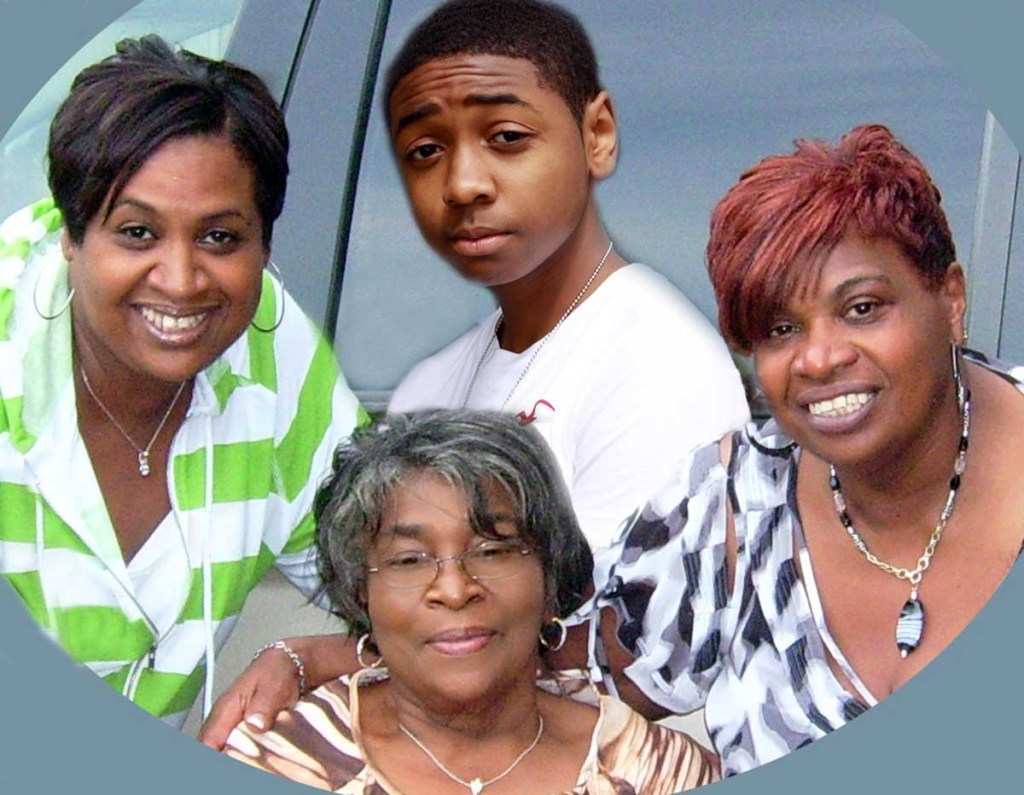Always a lot of love; Family looks to matriarch for guidance, advice
Published 9:07 am Sunday, May 11, 2014

- Shown are Bertha’s granddaughter, LaQuita Wilson; great-grandson, Tyrese Baker; eldest daughter, Gladys Hammond; and in the center, Bertha. “My mother is truly a great mother, grandmother and great-grandmother. I thank God for her everyday,” said Gladys.
For Bertha Flanigan of Colony, Mother’s Day will be spent with her family gathered around, eating her homemade banana pudding and enjoying the company of her children, in-laws and grandchildren. The house will be filled with laughter and love, just as it has for the past 40 years since it was built.
Before two fires destroyed their previous homes, the family lived in houses like everyone lived in back in the ’40s and ’50s. The ones where the children ran in and out all day, slamming a creaky screen door and swinging on the porch swing while making up songs, or taking turns in a tire swing out in the yard.
At night, Bertha would call them inside, give them baths and tell them stories until time for bed. In the winter, that meant crawling up under nine layers of quilts to stay warm.
She learned to cook from her own mother when she was just a child. By the age of 16, she was married to Norris Flanigan, the son of a farmer, who was a truck driver. Together they raised seven strong, healthy, happy children on what they could grow, and a lot of love.
Especially love.
“We didn’t have much, but we always had food, and we were close. There has always been a lot of love in our family,” said Ms. Bertha recently.
At 75, she is the matriarch of the family. Her husband, Norris, passed away in 2009. The family still looks to her for guidance, much the way she looked to her mother, who lived to be 91 years old. “She always gave us good advice,” she recalls. “There were five children in our family and she always taught us to have good manners, to respect our elders and to find the good in people. She taught me how to survive …”
Survival was a way of life in the years following the Great Depression. Fortunately, the elder generation of Flanigans had a farm. That, coupled with the fact that Norris had a good job driving a truck locally, ensured that there was always enough food on the table to feed seven growing children.
Monday was wash day, but with a family that big it sometimes spilled over into Wednesday and occasionally Friday. Back then, Ms. Bertha did her laundry either in the backyard in a big cast iron washpot, or at nearby Dean Creek. She built a fire, put their clothes and linens in the boiling water, washed them, and, in some instances, she starched them with homemade starch. “If I didn’t have the money to buy starch, then I just made it with flour, sugar and water,” she laughed. “My husband liked a lot of starch in his clothes.”
She hung the wash out on a clothes line, winter and summer, then ironed for hours the next day.
She cooked on a wood burning stove, which meant that there was always wood to chop. They heated with coal, so there was another chore – all to be hauled into the house. “Food tasted better on those old stoves,” she said. “I can remember the first electric stove we ever had. It was hard to learn how to cook on it because food burned more easily than on a woodstove.”
She canned and froze copious amounts of vegetables to see her family through the winter months, then placed the packages of beans, peas, corn, okra and soup in a huge freezer.
The children came in stairsteps. First Gladys, then Norris Jr., Cecelia, Edsel, Marlon, Michael and Shonda. On Sundays and special occasions, the children were bathed and dressed in their finest clothes, little frilly socks, patent leather shoes and pinafores for the girls, starched shirts and ties, and spit-shined shoes for the boys. She dressed the oldest ones first because they could sit still longer. As each one was finished, they were lined up on the couch to wait for the others to be ready.
There was a lot of fidgeting, but they knew better than to mess up her hard work!
She put them into the family car and took them to her parent’s house quite often on these occasions.
Daughter Cecelia remembers May Day celebrations when her mother would get up early in the morning and go to Cullman to buy them new clothes. “She always came back with each of us something new to wear,” she said.
May Day celebrations were a big event back in the day. “I can remember planting the May pole and dancing around it with ribbons,” laughed Cecelia. “Schools like Warrior and others from far away came to play ball and other games.”
Oldest daughter, Gladys Hammond, recalls her mother making homemade ice cream on hot summer days. The children took turns working the crank, and the little ones sat on top as the mixture hardened and it got more difficult to turn.
Times weren’t always so happy, though. The family lost everything they had, not once, but twice. The first time, the family was in bed. Norris was working and she had gotten them all to sleep, only to wake up with flames already in the room where they slept. She frantically grabbed each one and lined them up by the door because she’d always heard that the fire would follow them when the door was opened. Sure enough, it came whooshing out right behind them. She was hysterical, thinking that she had left one of her babies inside. Neighbors reassured her that all seven were safe. She had managed to bring them out without a hair being singed.
The second time she was at the laundromat with one of her older daughters. A neighbor called to inform them that their house was in flames. For the second time, they lost everything material, but no one was hurt.
Her children started school in Colony. In the ’60s, when schools were desegregated, they were bussed to Hanceville. She was apprehensive, but eventually she realized that they were safe, that people knew the Flanigan name from the farm.
“It took a while to overcome the fear,” she confessed. “But people took to them and it was fine.”
Norris Jr. played football at Hanceville High, and they all graduated high school there.
Gladys lives in Michigan now. When she found out that she had cancer, Bertha flew up to help her recuperate. “I didn’t realize that I’d given up until I saw her walk into the yard. I broke down,” she said. “But she gave me the strength to fight again.”
Gladys says that the family has learned to overcome hardships in life because they come from such a strong mother. “She always taught us that anything is possible with God’s help.”
Ms. Bertha worked outside the home at Americold for 23 years as a line operator and a presser.
As her children grew up and left home, she watched them become good, honest people who carried their “raising” with them. “We’ve always been ‘family’ people,” she said. “We stayed close.”
Then in 2009, when her life seemed complete and she was contented with her many blessings, her son, Norris, died after a long battle with cancer. She and Cecelia made the trip to Birmingham several times a week. “I watched her sit and talk to him about dying and I would ask her how she could do that,” said Cecelia. “She did it because he needed her and she was there for him.”
In lightning quick succession she lost her oldest son, her brother-in-law, her husband and her sister — all within a year’s time.
“I saw her go through all of that and I was amazed at her strength,” says Cecelia. “My dad died suddenly and she never wavered…she told us that the Lord carried her through it.”
This Mother’s Day, the Flanigan family will gather at the big table where they have so many times before. They will enjoy another meal of ham, dressing, corn on the cob, green beans, sweet potato casserole, turnip greens, pecan pie and chocolate cake. And they will look upon the face of the woman who has become an icon in their family — the one who taught them right from wrong, to have faith in God and to find the good in every situation.
And she will look at the faces of her loved ones, her children, 20 grandchildren, 17 great-grandchildren (and another one coming in July), and see in them the eyes of her parents, hear the laughter of her siblings echoing in theirs, and occasionally she will see the familiar flash of her husband’s smile. They have made her proud…
“I’ve been blessed,” she said humbly.





